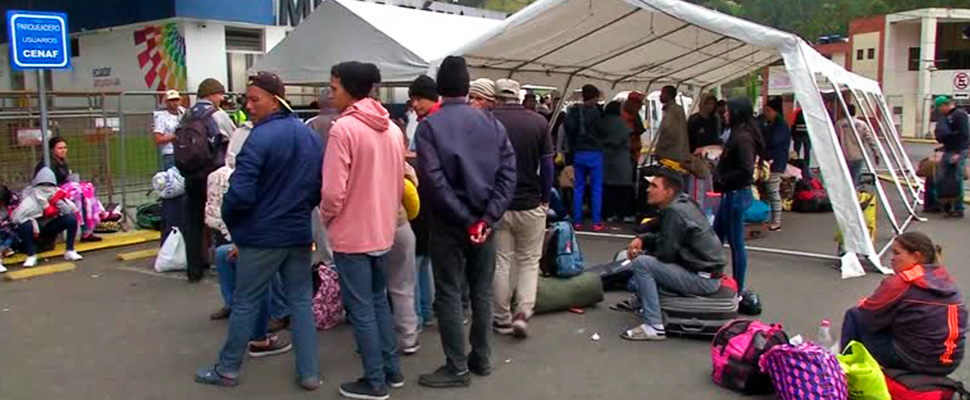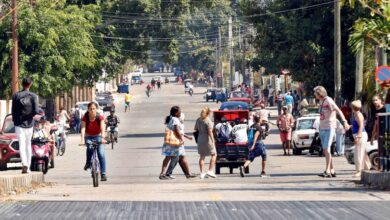Venezuelans in Argentina, caught in a crisis … again
Andreina Pirrone traveled from Venezuela to Argentina six years ago, while her country was moving towards the worst humanitarian crisis in its history. I didn't know what the future held, but I was sure it would be something better.

Group of Venezuelan migrants. / Via REUTERS
Reuters | Cassandra Garrison
Listen to this article
Leer en español: Venezolanos en Argentina, atrapados en una crisis…otra vez
Pirrone, an employee of a pasta factory in Buenos Aires, now feels a sense of "deja vu", as her adoptive home falters towards its own economic crisis with inflation above 50% and its currency, the peso, depreciates amid fears of debt default.
Argentina's uncertainty hits the vast Venezuelan community in the South American country, who mostly moved to these lands to escape rising poverty, escalating inflation and strict controls on the exchange rate and food.
"It's not something I would like to go through again. Besides, I worked very hard to get my family out of there and possibly bring them to the same thing," said Pirrone, whose mother and sister joined her in Argentina.
It would be difficult to leave Argentina, but would consider it if things got worse, especially with a probable change of government towards the end of the year, she estimated.
"I did not leave Venezuela to fall back into another type of similar government (therefore) yes, I would leave," she added.
The president of the Argentine right-wing center, Mauricio Macri, was heavily beaten in the August primary election, which makes it very likely that the October presidential elections will be won by the Peronist opposition candidate, who is accompanied on his list by the populist former president Cristina Fernández de Kirchner.
Argentina, the fourth destination on the list of Venezuelan migrants, has been in recession and taking emergency measures to face economic crises since last year.
Read also: Peru will raise border control to prevent illegal entry of Venezuelans
The result of the August 11 elections caused a new decline in the market, with the peso losing more than a quarter of its value against the dollar only in the eighth month of the year.
In response to this decline in domestic markets, Macri launched plans to delay debt payments and imposed exchange controls to protect the local currency.
For some expatriate Venezuelans, this brought back memories of what happened in their home, which for a long time has been under currency controls that many consider as the root of the country's economic malaise.
"The first thing you really think is to go elsewhere," said Alejandro Dugarte, an employee of a digital payment company in Buenos Aires, who left Venezuela three years ago.
"We already live it (the crisis), living it back is not my plan," he told Reuters from the living room of the Buenos Aires department he shares with his girlfriend, adding that he still had no concrete plans of where or when he would move, or if he would.
Paradise VS Chaos
In recent years, an estimated 4.3 million Venezuelans have fled an economic collapse in their home country that has caused a humanitarian crisis and a shortage of food and medicine. Most have dispersed throughout South America.
The sound of Venezuelan salsa music and the aroma of the arepas have become common in cities throughout the region, including Buenos Aires. About 650,000 registered Venezuelan immigrants have settled in Argentina in recent years.
Juan José Granados Hernández said he sold eggs at his father's farm in Venezuela until the money was no longer enough to feed everyone in his home. Now, he is an order delivery cyclist of Rappi and Glovo applications in Buenos Aires.
"Venezuela is total chaos. Here it is still a paradise compared to Venezuela," he said, adding that Macri "opened the door" for Venezuelans.
However, political uncertainty has scared some Venezuelans. Fernández de Kirchner, candidate for the Vice Presidency for the Peronist opposition list, led the country between 2007 and 2015 and was an ideological ally of Venezuelan President Nicolás Maduro.
For her part, his formula partner and candidate for president, Alberto Fernández, has criticized the regional demands that Maduro resigns and said that if he is elected he will join Mexico and Uruguay to promote talks between Maduro and the opposition.
Read also: US increases aid budget for Venezuelan migration crisis
That would represent a major policy change that would end with almost four years of raucous criticism against Maduro under President Macri's mandate.
Maduro blamed Venezuela's economic problems for US sanctions and said they have led some Venezuelans to try their luck in other countries, but that the extent of the crisis and the number of migrants has been exaggerated.
Venezuelans distrusted Fernandez de Kirchner's leftist policies because they had "fear and terror of everything that has to do with socialism," said Sofia Nunes, a Venezuelan journalist who has lived in Argentina for five years and works for local news site 'Urgente24'.
Nunes has appeared on Argentine television criticizing the situation in Venezuela and added that he had talked with his friends about leaving Argentina, but could not imagine rebuilding his life again.
"I'm going to go where? To suffer again, where?" Commented Nunes.





